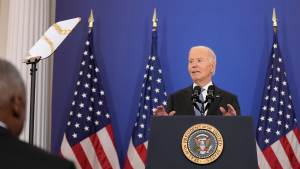Biden's Foreign Policy Legacy and What Trump is Inheriting
 Play Video
Play Video
About This Episode
President Biden entered office with ambitious foreign policy goals and is leaving a complicated legacy. Though he navigated the global COVID-19 pandemic, rallied allies to support Ukraine, and implemented policies to address climate change, challenges such as the chaotic Afghanistan withdrawal, record illegal border crossings, the war in Gaza, and high inflation marred his term. The Gaza cease-fire that looks eminent mirrors a Biden proposal, yet Donald Trump has claimed credit for the deal. Will Biden’s presidency be remembered as an interlude between two Trump terms? Jamil Anderlini, Anton La Guardia, and Carla Anne Robbins join Ivo Daalder on this week’s World Review to evaluate Biden’s foreign policy record and what he leaves behind for Trump, including the Gaza cease-fire deal that Israel’s cabinet still needs to ratify and waning public support for continuing to aid to Ukraine.
While we encourage you to watch or listen to the episode (and subscribe wherever you get your podcasts!), these are Ivo's top takeaways from today's discussion:
- Few regions in the world have been transformed as much during Biden’s four years in office than the Middle East. Earlier today, Israel’s security cabinet approved the phased ceasefire deal that will halt the fighting in Gaza and start the release of hostages—a fitting coda to the end of 15 months of hard-fought diplomacy. But Carla suggested that the deal, which is essentially unchanged from the one Biden first hailed last May, came about only because Trump was elected and Benjamin Netanyahu knew he had to accede to his demands given Trump would be president for the next four years. Even then, there is no guarantee that the deal will last beyond the first phase, as Netanyahu has every incentive to restart the war after the first group of hostages has been released (as I wrote yesterday). Meanwhile, the Middle East has been transformed, providing Trump with both great peril and great opportunity. The peril lies in a nuclear arms race between Iran, Saudi Arabia, and others in the region, a violent disintegration of Syria, and a continued conflict between Israel and the Palestinians. The opportunity lies in the possibility of a deal with Iran that trades sanctions relief for an end to Tehran’s nuclear program and support for regional proxies and a normalization deal between Israel and Saudi Arabia. Like Biden, Trump will have his hands full with the region.
- In Europe, the transformation of the region came at the behest of Vladimir Putin, whose full-scale invasion of Ukraine has returned the continent to the edge of major war. Well over 1 million Russians and Ukrainians have been killed and wounded in the war. Biden was critical in marshaling European support for Ukraine and Putin was left with a stronger and bigger NATO. But Biden also was hesitant to fully support Ukraine, often waiting to provide it with the weapons it needed to defend itself against the superior Russian force. The result was what Anton called a “protracted war” that has cost both sides greatly and brings the end of the war no closer in sight. Trump has promised to end the war in 24 hours, “even before my inauguration.” That’s not going to happen. But he may seek to use US leverage over Ukraine to force it to the table and perhaps offer Russia sanctions relief to convince it to stop fighting. Or he may decide that he can’t afford a Ukrainian defeat, which will lead to massive turmoil and refugee flows. Biden’s failure to execute the Afghanistan withdrawal hung over his entire presidency, and Trump may not want a similar failure to hang over his.
- Finally, in Asia, Biden built on the consensus that emerged in Trump’s first term that China posed the greatest strategic threat to US interests. He effectively strengthened alliances and created new and deeper relationships with key countries in the region—including Korea, Japan, Australia, the Philippines, and India. His efforts to limit Chinese access to advanced technology were largely successful, though their full impact remains to be seen. But the absence of a serious economic dimension to Biden’s engagement undermined part of his efforts. While Trump inherits a stable framework for the region, Jamil pointed out that China is suffering economically, dismissing statements that the Chinese economy met its 5-percent growth target as “ludicrous, a made-up number.” But while a strong, rising China is a challenge for the United States, a weak, faltering China is worse. To deflect attention away from troubles at home, Beijing may decide it needs to act abroad, and Taiwan is a tempting target, especially since it is not at all clear that Trump would defend the island in case of an attack. Indeed, one of the more interesting things to watch is how Trump, who has stacked his administration with China hawks, will actually deal with China, which he has historically seen as an economic rather than geostrategic threat.
That’s it for Ivo's quick takes of this week’s episode. To get the full flavor, please watch or listen to the episode.
Prefer to Listen?







